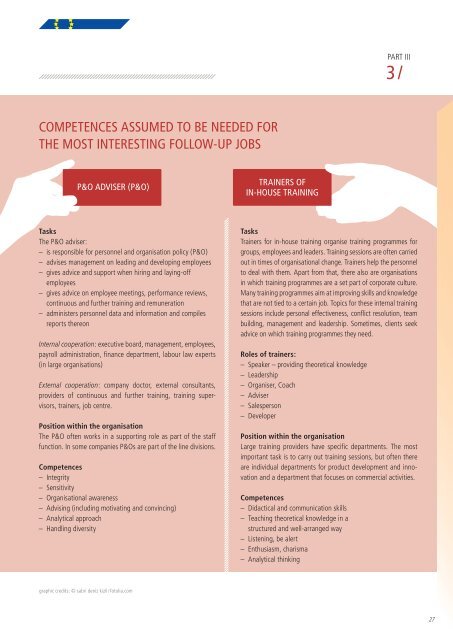RECOGNITION OF NON-FORMAL AND INFORMAL ... - Solidar
RECOGNITION OF NON-FORMAL AND INFORMAL ... - Solidar
RECOGNITION OF NON-FORMAL AND INFORMAL ... - Solidar
You also want an ePaper? Increase the reach of your titles
YUMPU automatically turns print PDFs into web optimized ePapers that Google loves.
PART III<br />
3 /<br />
COMPETENCES ASSUMED TO BE NEEDED FOR<br />
THE MOST INTERESTING FOLLOW-UP JOBS<br />
P&O ADVISER (P&O)<br />
TRAINERS <strong>OF</strong><br />
IN-HOUSE TRAINING<br />
Tasks<br />
The P&O adviser:<br />
– is responsible for personnel and organisation policy (P&O)<br />
– advises management on leading and developing employees<br />
– gives advice and support when hiring and laying-off<br />
employees<br />
– gives advice on employee meetings, performance reviews,<br />
continuous and further training and remuneration<br />
– administers personnel data and information and compiles<br />
reports thereon<br />
Internal cooperation: executive board, management, employees,<br />
payroll administration, fi nance department, labour law experts<br />
(in large organisations)<br />
External cooperation: company doctor, external consultants,<br />
providers of continuous and further training, training supervisors,<br />
trainers, job centre.<br />
Position within the organisation<br />
The P&O often works in a supporting role as part of the staff<br />
function. In some companies P&Os are part of the line divisions.<br />
Competences<br />
– Integrity<br />
– Sensitivity<br />
– Organisational awareness<br />
– Advising (including motivating and convincing)<br />
– Analytical approach<br />
– Handling diversity<br />
Tasks<br />
Trainers for in-house training organise training programmes for<br />
groups, employees and leaders. Training sessions are often carried<br />
out in times of organisational change. Trainers help the personnel<br />
to deal with them. Apart from that, there also are organisations<br />
in which training programmes are a set part of corporate culture.<br />
Many training programmes aim at improving skills and knowledge<br />
that are not tied to a certain job. Topics for these internal training<br />
sessions include personal effectiveness, confl ict resolution, team<br />
building, management and leadership. Sometimes, clients seek<br />
advice on which training programmes they need.<br />
Roles of trainers:<br />
– Speaker – providing theoretical knowledge<br />
– Leadership<br />
– Organiser, Coach<br />
– Adviser<br />
– Salesperson<br />
– Developer<br />
Position within the organisation<br />
Large training providers have specifi c departments. The most<br />
important task is to carry out training sessions, but often there<br />
are individual departments for product development and innovation<br />
and a department that focuses on commercial activities.<br />
Competences<br />
– Didactical and communication skills<br />
– Teaching theoretical knowledge in a<br />
structured and well-arranged way<br />
– Listening, be alert<br />
– Enthusiasm, charisma<br />
– Analytical thinking<br />
graphic credits: © sabri deniz kizil / fotolia.com<br />
27
















